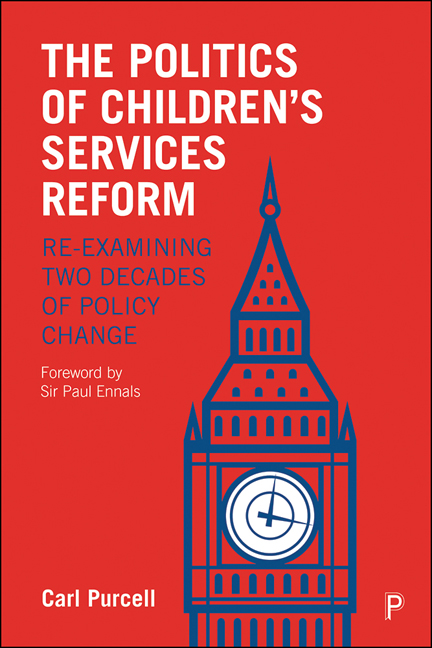Book contents
- Frontmatter
- Dedication
- Contents
- List of Abbreviations
- Acknowledgements
- Foreword
- Introduction
- 1 What Drives Children’s Services Reform?
- Part I Children’s Services Reform Under the Labour Government (1997– 2010)
- Part II Children’s Services Reform Under the Coalition and Conservative Governments (2010– 19)
- Conclusion: the Politics of Children’s Services Reform
- Appendix: Chronology of key Reports
- References
- Index
2 - The Labour Leadership and Children’s Policy
Published online by Cambridge University Press: 03 March 2021
- Frontmatter
- Dedication
- Contents
- List of Abbreviations
- Acknowledgements
- Foreword
- Introduction
- 1 What Drives Children’s Services Reform?
- Part I Children’s Services Reform Under the Labour Government (1997– 2010)
- Part II Children’s Services Reform Under the Coalition and Conservative Governments (2010– 19)
- Conclusion: the Politics of Children’s Services Reform
- Appendix: Chronology of key Reports
- References
- Index
Summary
Introduction
Ask me my three main priorities for government and I tell you: education, education and education. (Blair, 1996)
We will be tough on crime and tough on the causes of crime, and halve the time it takes persistent juvenile offenders to come to court. (Labour Party, 1997)
Tackling child poverty and disadvantage is not about providing either more money or better public services; it is of necessity about both. (Brown, in HM Treasury, 2001: foreword)
The election of a Labour government in 1997, with a substantial majority in Parliament, was an exciting prospect for the children's sector. After decades of campaigning and debate around children's policy, there was a strong sense of hope that action would now follow. This chapter asks what changed in the early years of the new government, assessing the extent to which this hope was well founded or misplaced. First, competing assessments of Labour's overarching approach to economic and social policy are briefly discussed. Many commentators on children's services reform have pointed towards the acceptance of policy priorities inherited from the Conservatives, as the discussion in Chapter 1 revealed, but alternative assessments must also be considered. This provides the platform for a discussion of three key areas of children's policy of interest to Blair and Brown in the second section: education, ‘problem’ young people and child poverty. The third section then focuses on the Treasury's engagement with Whitehall in the early Labour years. This includes a discussion of the role played by NGOs representing the children's charity sector, and the emergence of the flagship Sure Start programme. The chapter begins to examine the main drivers of children's policy while providing an essential platform for further discussions of the Labour period in subsequent chapters.
Labour economic and social policy
Following a fourth successive election defeat in 1992, Labour embarked upon a major review of its approach to economic and social policy. The report of the Commission on Social Justice (1994) was critical of the neoliberal approach pursued by the Conservative government since 1979, highlighting significant increases in social inequality and the degradation of public services. However, the commission's report also urged Labour to acknowledge the importance of private enterprise and accept that social justice could not be achieved through greater state control over the economy and public services alone.
- Type
- Chapter
- Information
- The Politics of Children's Services ReformRe-examining Two Decades of Policy Change, pp. 23 - 42Publisher: Bristol University PressPrint publication year: 2020



